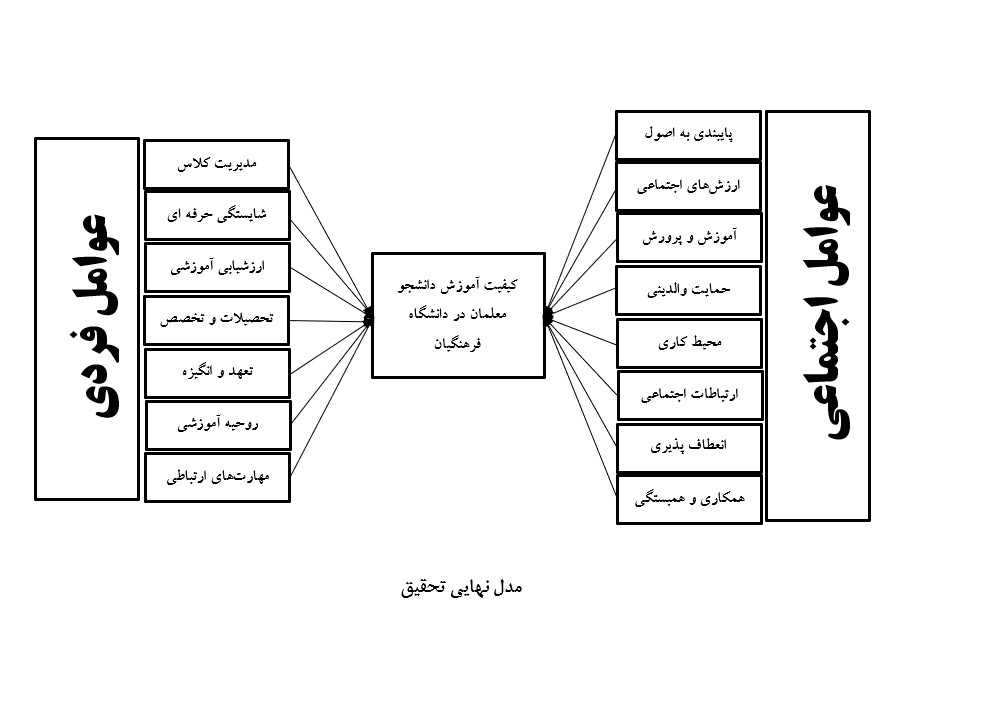Conceptual Model of Factors Affecting the Quality of Teacher Education at the Teacher Training University: A Qualitative Study Using Fuzzy Delphi Technique
Keywords:
Model , Quality of Education, individual and social factors, Fuzzy Delphi, Farhangian UniversityAbstract
The present study aimed to design a model of factors affecting the quality of education for student-teachers at the Teacher Training University using the fuzzy Delphi technique. This research is applied in purpose and survey-based in nature. The statistical population consisted of education experts who were identified based on criteria such as expertise and experience in the relevant field. Eighteen of these experts participated in the current study. After reviewing the literature and conducting semi-structured interviews along with relevant coding, the initial model was designed. Then, to screen the indicators, the fuzzy Delphi technique was applied. In this technique, values above 0.7 were confirmed by the experts. The designed model includes 15 components of individual and social factors. Seven components fall under individual factors (classroom management, professional competence, educational assessment, education and specialization, commitment and motivation, teaching spirit, and communication skills), while eight components are under social factors (adherence to principles, social values, education and training, parental support, work environment, social communications, organizational flexibility, and collaboration and solidarity). This study showed that the quality of education for student-teachers at the Teacher Training University is influenced by various factors. Based on the findings of this study, considering both individual and social dimensions can provide a foundation for enhancing the quality of education provided to student-teachers.
Downloads
References
Ball SJ. The education debate: Policy Press; 2021.
Ali Ghorbani M, Zolfaghari R, Imani MN. Identifying Dimensions and Components of Innovative Teaching Methods in Higher Education. Sociology of Education. 2024;10(1):355-65. doi: 10.22034/ijes.2024.559157.1340.
Golabchi H, Kiaee M, Kameli MJ. Designing a Superior Service Delivery Model in Education to Enhance Public Satisfaction. Iranian Journal of Educational Sociology. 2024;7(1):189-97. doi: 10.61838/kman.ijes.7.1.18.
Mohammadi Komroudi MJ, Ahmadi M, Farhadi Mahalli A. Designing an Ethically-Oriented Management Model for Employee Education Development in Higher Education Using Grounded Theory (Case Study: Free Universities of Mazandaran Province). Iranian Journal of Educational Sociology. 2024;7(2):114-23. doi: 10.61838/kman.ijes.7.2.14.
Bezi A, Fakoori H, Bayani AA, Saemi H. Design and Validation of an Environmental Education Curriculum Model for Higher Education Based on the "Aker" Approach. Iranian Journal of Educational Sociology. 2024;7(1):79-90. doi: 10.61838/kman.ijes.7.1.8.
Delghandi M, karimi M, Nodehi H, Cherabin M. Designing an Efficient Virtual Education Pattern in Farhangian University. Sociology of Education. 2024;10(1):280-94. doi: 10.22034/ijes.2024.2012176.1469.
Jafarzadeh Ghadimi R, Enayati T, Salehi M. Identifying Dimensions of an Innovative University to Provide a Model (Case Study: Islamic Azad University). Iranian Journal of Sociology of Education. 2018;1(8):115-35.
Darling-Hammond L. Defining teaching quality around the world. European Journal of Teacher Education. 2021;44(3):295-308.
Hsieh TL. Motivation matters? The relationship among different types of learning motivation, engagement behaviors and learning outcomes of undergraduate students in Taiwan. Higher Education. 2014;68:417-33.
Prasad S, Tata J. The role of socio‐cultural, political‐legal, economic, and educational dimensions in quality management. International Journal of Operations & Production Management. 2003;23(5):487-521.
Ren X, Tong Y, Peng P, Wang T. Critical thinking predicts academic performance beyond general cognitive ability: Evidence from adults and children. Intelligence. 2020;82:101487.
Uyulgan MA, Akkuzu N. An Overview of Student Teachers' Academic Intrinsic Motivation. Educational Sciences: Theory and Practice. 2014;14(1):24-32.
Erdem E, Demirel Ö. Teacher self-efficacy belief. Social Behavior and Personality: An International Journal. 2014;35(5):573-86.
Furlong J, Maynard T. Mentoring student teachers: The growth of professional knowledge: Routledge; 2012.
Altınay Z. Evaluating peer learning and assessment in online collaborative learning environments. Behaviour & Information Technology. 2017;36(3):312-20.
Irvine JJ. Educating teachers for diversity: Seeing with a cultural eye: Teachers College Press; 2003.
Salehi Zadeh M, Ghorchian N, Mohammad Davoodi AH, Gholavandi H. Presenting a model for enhancing the quality of professional teaching among faculty members of Farhangian University. Research in Teaching Quarterly. 2019;7(2).
Agrati LS. Tutoring in the Metaverse. Study on Student-Teachers’ and Tutors’ Perceptions About NPC Tutor. Frontiers in Education. 2023;8. doi: 10.3389/feduc.2023.1202442.
Ebrahimi A, Zeinabadi H, Hadavandi MR. A Qualitative Study of Factors Influencing the Desire for Retention of Student-Teachers at Farhangian University in the Ministry of Education: Case Study of Tehran Province. Semi-Annual Scientific Research Journal of Educational and Academic Studies. 2018;6(17):Autumn and Winter 2018.
Frei-Landau R, Grobgeld E, Guberman R. Implementing Digital Neuroscience in Special-Needs-Teacher Education: Exploring Student-Teachers’ Multifaceted Learning Outcomes Related to Teaching Children With Neurodevelopmental Disorders. Frontiers in Psychology. 2023;14. doi: 10.3389/fpsyg.2023.1232315.
Karimi A, Gholtash A, Machinchi AA. Develop and validate a model for teaching metacognitive skills based on quantum thinking to student-teachers. Sociology of Education. 2023;9(1):359-70. doi: 10.22034/ijes.2022.544223.1207.
Knobe M, Holschen M, Mooij SC, Sellei RM, Münker R, Antony P, et al. Knowledge Transfer of Spinal Manipulation Skills by Student-Teachers: A Randomised Controlled Trial. European Spine Journal. 2012;21(5):992-8. doi: 10.1007/s00586-011-2140-8.
Mannathoko MC. Does Teaching Practice Effectively Prepare Student-Teachers to Teach Creative and Performing Arts? The Case of Botswana. International Journal of Higher Education. 2013;2(2). doi: 10.5430/ijhe.v2n2p115.
Obispo RT, Magulod GC, Tindowen DJ. Teachers’ Classroom Management Styles and Student-Teacher Connectedness and Anxiety. International Journal of Learning Teaching and Educational Research. 2021;20(5):123-41. doi: 10.26803/ijlter.20.5.7.
Rafiei M, Sharifi M. The status of Quranic literacy among students (Case Study: Student-teachers at Farhangian University). Biannual Journal of Quran Recitation Studies. 2023;11(21).
Abedini M, Mansouri S, Kamali Ardakani HR. Identifying and ranking factors affecting effective teaching in medical sciences universities based on structural interpretive modeling. Journal of Jundishapur Education Development. 2020;11(3).

Downloads
Published
Submitted
Revised
Accepted
Issue
Section
License
Copyright (c) 2025 Zahra Yarahmadi (Author); Mehri Daraei (Corresponding author); Hossein Mehrdad (Author)

This work is licensed under a Creative Commons Attribution-NonCommercial 4.0 International License.










